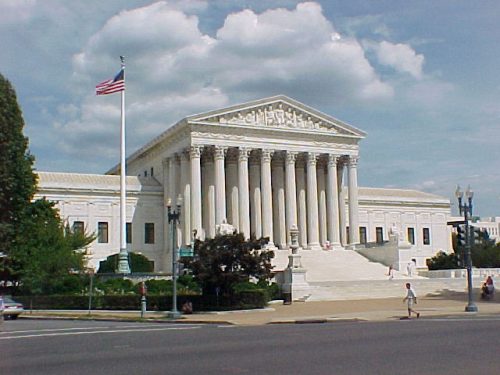

Via Flickr

This work is licensed under a Creative Commons Attribution 2.0 Generic License.
By The Vanguard Staff
WASHINGTON, DC – A “landmark victory for tribal sovereignty” was issued by the U.S. Supreme Court Thursday, according to the ACLU, “rejecting all the constitutional challenges to the Indian Child Welfare Act (ICWA), legislation that seeks to ensure that Native families stay together, and that Native children are raised by tribal members.”
“This decision recognizes the centuries-long history of Native child removal pursuant to state and federal policies, but the work is far from over. Today, states still continue to remove Native children from their families and tribes at alarmingly high rates. Fourteen states have already incorporated ICWA protections into their own codes, and several more states are poised to do the same,” explained the ACLU.
The ACLU amicus brief was presented in August 2022, and argued the “Indian Child Welfare Act was passed by Congress in 1978 to address the nationwide epidemic of American Indian children being forcibly removed from their homes by child welfare agencies and placed into non-Native homes at disproportionate rates.
“Throughout history, federal and state governments have sought to undermine and threaten the existence of tribes via the forced separation and assimilation of Native children. ICWA requires state courts to make active efforts to keep Native families together. The law aims to prioritize the placement of Native children within their extended families or tribal communities, where their cultural identities will be understood and celebrated.
The ACLU warned that if the “Supreme Court overturns ICWA, states would once again be allowed to indiscriminately remove Native children from their families and culture while simultaneously depriving tribes of future generations — putting the very existence of tribes in jeopardy.”
“Throughout history, the United States government has enacted countless policies to steal Indigenous children from their homes and to erase their identities,” said Theodora Simon (Navajo), Indigenous Justice Advocate with the ACLU of Northern California.
Simon added, “The explicit goal of these policies was, and continues to be, the complete erasure of Indigenous people. If the Indian Child Welfare Act is overturned, tribes will again be stripped of their right to keep their families together. This is a tragedy as we know that having connection to our cultures, languages, and identities is in the best interest of Native children.”
“Tribes have an inherent right to govern themselves and make decisions on issues that affect their people — including Native children,” said the ACLU, adding, the Indian Child Welfare Act is constitutional and urges the Supreme Court to uphold the centuries-long legal precedent upholding tribal sovereignty — including tribes’ right and ability to preserve their unique cultural identities, raise their own children and govern themselves.”
“Native families have a right to stay together, care for their children, and preserve tribal culture by ensuring access to their cultural identity, language, and heritage. We call on every remaining state to stand with Indigenous governments by passing their own state ICWAs now,” said Crystal Pardue, staff attorney in the Racial Justice Program at the American Civil Liberties Union.
“Tribes have a fundamental right to govern themselves and make decisions on issues that affect their own people — including Native children — without interference from federal or state governments,” added Pardue.
An amicus brief in Brackeen v. Haaland was filed by the ACLU, ACLU of NorCal, ACLU of Alaska, ACLU of Arizona, ACLU of Maine, ACLU of Montana, ACLU of Nebraska, ACLU of New Mexico, ACLU of Oklahoma, ACLU of South Dakota, North Dakota, and Wyoming chapter, ACLU of Texas, ACLU of Utah, and ACLU of Washington. 
For once SCOTUS makes a good ruling. This is a seldom occurance these days.